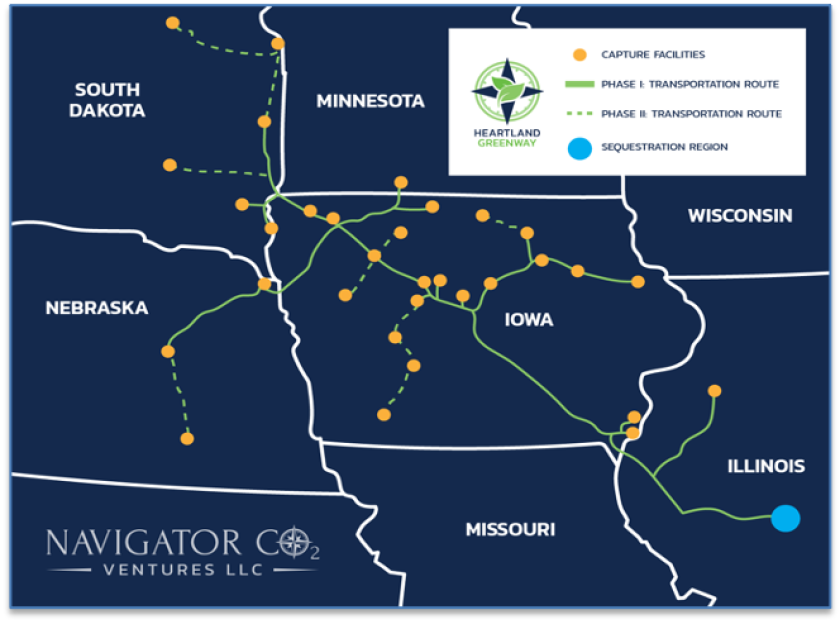OMAHA, Neb. — Navigator CO2 Ventures, the developer of a multi-state carbon capture pipeline, is canceling the project.
The company, which has faced setbacks on permitting, announced Friday, Oct. 20, that it would scrap its project to collect carbon emissions from ethanol plants in five states.
ADVERTISEMENT
In its announcement, the company cited “the unpredictable nature of the regulatory and government processes involved, particularly in South Dakota and Iowa.”
In addition to South Dakota and Iowa, the project was to include one plant in Minnesota and plants in Nebraska and Illinois. The storage area was planned for Illinois, where Navigator recently withdrew a permit application.

Navigator’s Heartland Greenway project and other carbon capture pipelines intended to benefit the ethanol industry and corn growers by helping the ethanol plants lower their carbon intensity score. Doing so would help open up potential markets for low-carbon fuel, such as California.
But the project encountered resistance from some landowners and county governments that passed ordinances to make siting the pipeline more difficult.
South Dakota had , citing local ordinances.
Tom Buis of the called the decision “incredibly disappointing.”
“Just as bioethanol doubled farm income in the last two decades, carbon capture projects are the next step in bringing even more value to farmers nationwide. These projects will create higher corn and land values and bolster our nation’s energy security,” Buis said in a news release.
ADVERTISEMENT
The Iowa Renewable Fuels Association issued this comment:
“Over the last year, we have been disappointed with the amount of disinformation that has been spread among the public and the regulators across multiple states. That does not happen by accident. Rather, it is being pushed by groups who oppose modern agriculture and whose stated mission is to destroy farming as we know it. While we respect Navigator’s decision, IRFA will continue to support multiple other CCS projects and we expect ultimate success.”
Opponents celebrate
Opponents have questioned the safety of the projects and their effectiveness at reducing greenhouse gas emissions. There also was pushback against the possible use of eminent domain to force landowners to provide a property easement for the pipeline.
In an emailed statement, Kim Junker, a Butler County, Iowa, farmer impacted by the Navigator pipeline, said, “It’s very rare for people of so many different backgrounds and beliefs to stand together against something. We did and we won. It was clear from the start that despite their billions of dollars the power of everyday people would overcome these pipeline scams. But the fight isn’t over, we need to remain vigilant and pass laws to make sure no other private corporation can threaten our land and our legacy again.”
Dakota Rural Action, a South Dakota group opposed to the pipeline, issued this statement:
"A HUGE congratulations goes out to all the landowners who have worked tirelessly over the last two years to get to this point — from holding public meetings to lobbying for local ordinances to joining the South Dakota Easement Team in hiring Brian Jorde for legal representation. This victory is a culmination and testament to the power of local grassroots organizing, where impacted people have a say in the issues that affect their lives. And a tremendous victory for people over profits on the prairie today!"
The projects would be funded in part by federal tax credits that provide incentives for carbon capture and storage.
ADVERTISEMENT
Emily Wurth of Food and Water Watch, an environmental group, released this statement:
“While the federal government keeps trying to waste billions of dollars to promote these massive carbon pipelines, grassroots organizing is winning the fight to stop these egregious handouts to corporate polluters. These carbon pipelines will not reduce emissions – they are dangerous, wasteful schemes to prolong and expand polluting industries. Instead of throwing away money supporting polluters, the government should invest in proven clean energy solutions, not carbon capture pipe dreams.”
Summit Carbon Solutions
Summit Carbon Solutions, which calls itself the world's biggest carbon capture project, with a planned underground storage site in western North Dakota, released a statement indicating that ethanol plants that were part of the Navigator pipeline could join its project.
“Summit Carbon Solutions welcomes and is well positioned to add additional plants and communities to our project footprint. We remain as committed to our project as the day we announced it. It’s not often you get the opportunity to positively impact an industry that touches every farmer and rural community across the Midwest."
Summit also had been denied a route permit in South Dakota, as well as in North Dakota. It has indicated it plans to refile in South Dakota and has appealed the decision in North Dakota. The appeal with the North Dakota Public Service Commission is awaiting a hearing.












